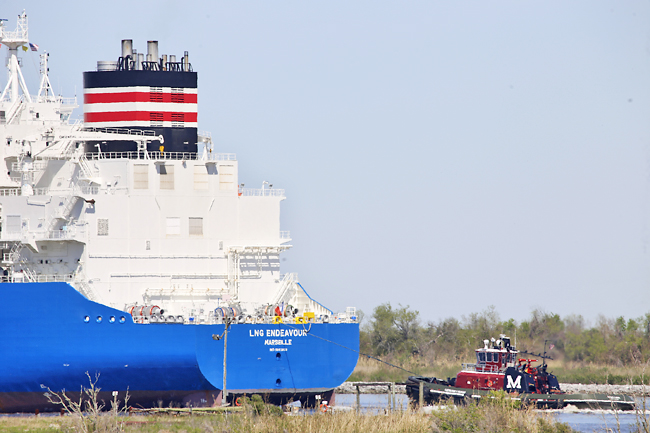FRANKFURT (AP) – Missiles and drones are flying in the Red Sea, disrupting one of the world’s key trade arteries and a chokepoint for energy shipments headed for Europe.
Attacks by Yemen’s Houthi rebels over Israel’s war with Hamas are posing a new threat to the future of energy supplies to the 27-country European Union (EU), which relies on imported natural gas to power factories, generate electricity and heat homes.
Tankers carrying liquefied natural gas – which is supercooled to travel by ship instead of pipeline – routinely pass through the Red Sea, and several shipments to Italy already have been cancelled.
Here are key things to know about the threat to Europe’s energy supplies from conflict in the Middle East.
WHAT IS GOING ON WITH RED SEA SHIPPING?
The Houthis have been firing drones and missiles at ships that pass by territory they control near the narrow Bab al-Mandab Strait at the southern end of the Red Sea.
The Houthis say they are striking Israel-bound ships to support Hamas in its war with Israel, although other ships have been targeted as well.
In response, the United States (US) and the United Kingdom have been attacking Houthi launch sites in Yemen since mid-January.




Security concerns have led shipping and some energy companies to reroute vessels around the southern tip of Africa instead of through the Suez Canal at the northern end of the Red Sea.
That is lengthening the journey to Europe from suppliers in the Middle East, like Qatar, by a week or more and raising costs.
Around 70 per cent of LNG shipments from Qatar that were headed for Italy’s major terminal on the Adriatic Sea were canceled in January. Last year, Qatar supplied 40 per cent of Italy’s LNG.
WHY IS LNG IMPORTANT?
Cooling natural gas to minus 162° C changes it into a liquid and reduces its volume by 600 times so it can be stored and shipped aboard specially designed vessels.
Upon arrival, it’s reheated into gas and transported by pipeline to distribution companies, industrial consumers and power plants.
Europe relied for decades on gas transported through pipelines from Russia. That came to an abrupt end after the war in Ukraine and cut off most of its supply. LNG became a lifeline, with the German government, for example, hastily lining up floating import terminals on its northern coast.
Last year, 12.9 per cent of Europe’s LNG went through the Red Sea from suppliers in the Middle East, mainly Qatar.
WHAT’S THE IMPACT ON SUPPLIES AND PRICES?
So far, there’s been little to no impact on natural gas prices. In fact, spot prices for natural gas have fallen since the Houthi attacks began, from around EUR45 (USD48.38) per megawatt hour before the start of the Israel-Hamas war to EUR28.37 on Tuesday.
Europe is getting a break because demand for natural gas is weak amid a sluggish economy.
Slow growth in China also has reduced competition. And LNG shipments from the US don’t have to go through the Red Sea.
Meanwhile, pipeline gas is still flowing from Norway and Azerbaijan, and Europe is buying some LNG from Russia despite sanctions.
A key factor has been Europe’s efforts to fill underground storage with gas ahead of winter: Storage is over 70 per cent full with most of the heating season over.
Russia’s cutoff sent gas prices rising sharply, surging inflation to record highs and helping drive a cost-of-living crisis. European governments and companies raced to secure alternatives.
HOW IMPORTANT IS US GAS TO EUROPE?
US gas exports rose sharply after February 2022. Since then, President Joe Biden has paused approving new proposals for LNG export terminals.
The pause would allow officials to study the impact of LNG projects on climate change, the US economy and national security, Energy Secretary Jennifer Granholm said.
The action would not affect five terminals that are already approved and under construction, she said.
Industry association Eurogas called Biden’s action “alarming” and said US gas imports are “set to play a crucial role for European energy security” in case of possible shortfalls.
Analyst Tagliapeitra said, however, that with plenty of new export capacity already approved, Biden’s decision would have “no short-term or even medium-term impact on Europe”.
US LNG capacity has doubled since exports began in earnest less than a decade ago, and it’s set to double again under already-approved projects.
The wisdom of investing more money in fossil fuel infrastructure is also being debated in Europe, which aims to cut greenhouse gas emissions by 55 per cent compared to 1990 levels by 2030.
Europe’s gas demand is expected to fall eight per cent over 2022-2026 as renewable energy like solar and wind power is scaled up.






